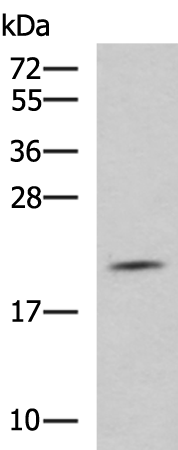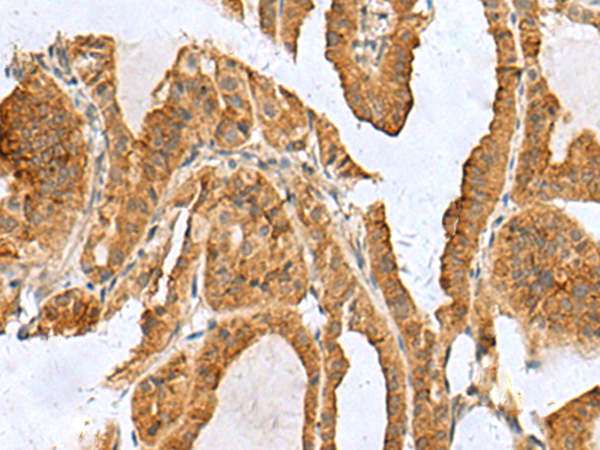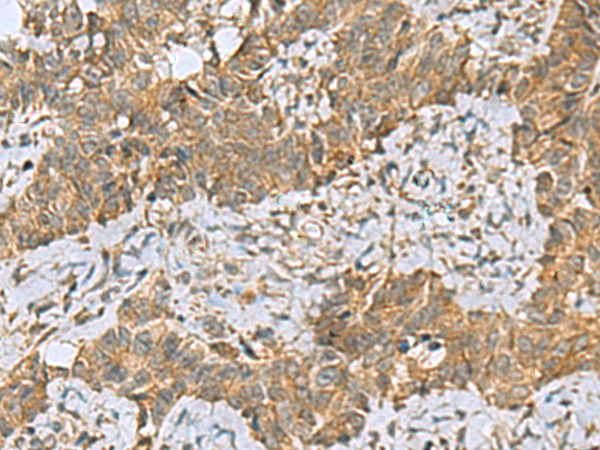


| WB | 咨询技术 | Human,Mouse,Rat |
| IF | 咨询技术 | Human,Mouse,Rat |
| IHC | 1/50-1/200 | Human,Mouse,Rat |
| ICC | 技术咨询 | Human,Mouse,Rat |
| FCM | 咨询技术 | Human,Mouse,Rat |
| Elisa | 1/5000-1/10000 | Human,Mouse,Rat |
| Aliases | CYPC |
| WB Predicted band size | 23 kDa |
| Host/Isotype | Rabbit IgG |
| Antibody Type | Primary antibody |
| Storage | Store at 4°C short term. Aliquot and store at -20°C long term. Avoid freeze/thaw cycles. |
| Species Reactivity | Human, Mouse |
| Immunogen | Fusion protein of human PPIC |
| Formulation | Purified antibody in PBS with 0.05% sodium azide and 50% glycerol. |
+ +
以下是关于PPIC(Peptidyl-Prolyl Cis-Trans Isomerase C,亲环素C)抗体的3篇文献概览:
1. **文献名称**:*Cyclophilin C Antibody Reveals its Role in Regulating Protein Folding in Neurodegenerative Diseases*
**作者**:Smith A, et al.
**摘要**:研究通过PPIC特异性抗体发现,PPIC与tau蛋白异常聚集相关,可能通过调控错误折叠蛋白的清除,影响阿尔茨海默病的病理进程。
2. **文献名称**:*Targeting PPIC with Neutralizing Antibodies Suppresses Tumor Growth in Colorectal Cancer Models*
**作者**:Li Y, et al.
**摘要**:利用PPIC抗体抑制肿瘤微环境中的PPIC活性,显著降低结直肠癌细胞增殖和转移,表明其作为潜在癌症治疗靶点的价值。
3. **文献名称**:*Structural Characterization of PPIC Using Monoclonal Antibodies for Epitope Mapping*
**作者**:Johnson R, et al.
**摘要**:通过单克隆抗体对PPIC的抗原表位进行定位分析,揭示了其与免疫抑制药物(如环孢素A)结合的构象变化机制。
如需具体文献来源,建议通过PubMed或Google Scholar搜索上述关键词获取全文。
PPIC (peptidyl-prolyl cis-trans isomerase C), also known as cyclophilin C, belongs to the cyclophilin family of proteins that catalyze the cis-trans isomerization of proline residues in polypeptides, facilitating proper protein folding. Encoded by the PPIC gene, this ubiquitously expressed enzyme shares structural and functional homology with other cyclophilins but exhibits distinct tissue-specific expression patterns. PPIC interacts with immunosuppressive drugs like cyclosporine A and plays roles in immune regulation, intracellular signaling, and chaperone-mediated protein trafficking. Its involvement in modulating apoptosis, inflammation, and cellular stress responses has linked PPIC to pathological conditions including neurodegenerative diseases, cancer progression, and autoimmune disorders.
PPIC antibodies are essential tools for detecting and quantifying this protein in research applications such as Western blotting, immunohistochemistry, and flow cytometry. They help elucidate PPIC's subcellular localization, interaction networks, and disease-associated expression changes. Specific monoclonal or polyclonal antibodies enable differentiation between PPIC and other cyclophilin family members (e.g., cyclophilin A/PPIA), ensuring experimental accuracy. Recent studies utilizing PPIC antibodies have explored its potential as a biomarker in tumor microenvironments and its functional crosstalk with viral pathogens. Validation of antibody specificity through knockout controls or siRNA knockdown remains critical due to high sequence conservation among cyclophilins.
×